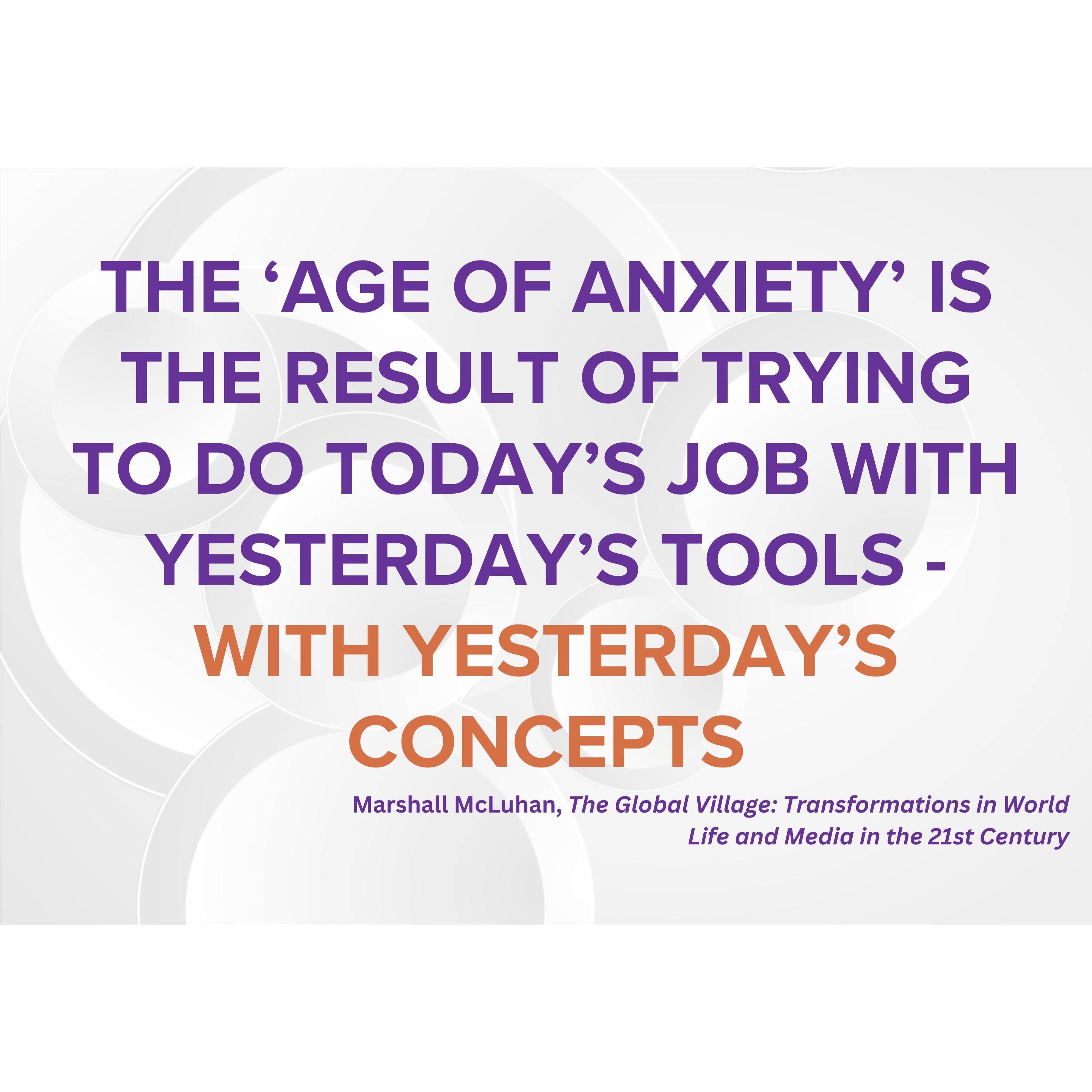Embracing Transformation in Business: Insights from Marshall McLuhan and Jack Myers

Marshall McLuhan's observed that "The Age of Anxiety is the result of trying to do today's jobs with yesterday's tools, with yesterday's concepts." Written in the early 1960s, McLuhan's observations resonate more than ever today. This statement underlines the critical disconnect that can occur when businesses fail to evolve alongside technological and societal changes. Jack Myers' theories on business transformation, along with McLuhan's, provide a comprehensive framework for understanding and navigating the imperative for change in organizational structures and business models. Integrating insights from both McLuhan and Myers can guide businesses towards successful transformations in a dynamic world.
Understanding McLuhan's Perspective
Marshall McLuhan, a visionary media theorist, famously introduced the idea that "the medium is the message" in his landmark book "The Medium is the Massage," emphasizing the role of media in shaping human experience and societal structure. His quote about the Age of Anxiety pinpoints the discomfort and inefficiency that arise when outdated tools and concepts are applied to contemporary challenges. In the business context, this means that relying on traditional practices that were effective in a stable, predictable environment can lead to failure in a fluctuating market landscape driven by digital innovation and changing consumer behaviors.
Jack Myers and the Need for Transformation
Jack Myers is the nation's leading media ecologist, a practice first named by McLuhan. As a thought leader in media economics and business transformation for the past four decades, Myers extends McLuhan's ideas into the corporate realm, focusing specifically on how businesses must radically adapt to thrive. Myers argues that the digital revolution, now accelerated by generative AI, is fundamentally altering how organizations must operate, from internal processes to customer interactions. His work highlights several key areas where transformation is essential:
1. Digital Integration: Myers emphasizes the importance of integrating digital technology not just as a tool, but as a central element of business strategy. This includes the adoption of data analytics, artificial intelligence, and cloud computing to enhance decision-making and operational efficiency.
2. Cultural Adaptation: According to Myers, organizational culture must evolve to embrace change and innovation. This involves cultivating a mindset that values agility, continuous learning, and flexibility among employees, allowing them to adapt to new technologies and market demands quickly.
3. Structural Reorganization: Myers advocates for rethinking traditional hierarchical organizational structures. He suggests more fluid and adaptable models that can respond rapidly to changes in the business environment, such as networked teams that operate cross-functionally.
Validating McLuhan and Myers Through Business Examples
The relevance of McLuhan's and Myers' theories can be observed in several contemporary business transformations:
- IBM's Pivot to Cloud and AI: Once known primarily for hardware, IBM has transformed its business model around cloud computing and artificial intelligence, recognizing the need to shift from outdated technologies to new, demand-driven services. This shift reflects both McLuhan's and Myers' emphasis on adapting tools and concepts to meet current needs.
- Adobe's Subscription Model: Adobe's shift from a product-based to a service-based model, moving from selling perpetual software licenses to a subscription-based cloud service, illustrates the adaptation to new business models prompted by digital technology, aligning with Myers' emphasis on digital integration.
- Nike's Digital Engagement: Nike has transformed its approach by focusing on direct-to-consumer digital sales channels and personalized marketing, leveraging digital media's power to reshape traditional retail and marketing strategies. This transformation is a direct response to the changing media landscape highlighted by McLuhan.
Marshall McLuhan's observation about the Age of Anxiety and Jack Myers' theories on business transformation collectively underscore the necessity for businesses to evolve beyond traditional frameworks and adapt to the modern digital era. By embracing new tools, rethinking organizational structures, and revising outdated concepts, businesses can mitigate the anxieties of change and position themselves for sustainable success in a constantly evolving marketplace. The journey of transformation, while challenging, is essential for survival and growth in today's dynamic business environment.

